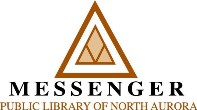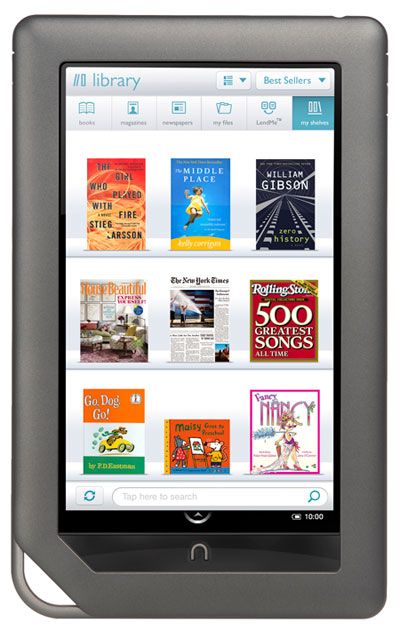The first part of this post consists of presentations from libraries who circulate eReaders; more pertinent to what we do for sure. But part two's Apple, Barnes & Noble, Borders, and Best Buy pitches (dubbed by a colleague "live infomercials") contain a lot of good information that could help us answer questions from patrons who already have these devices.
Library eReader Presentations
You can see the slides from the great presentations here. But it seems like it might be a temporary link, so feel free read on for my notes and observations.
Ming Heraty, Arlington Heights Library
40 eReaders circulate, varying brands. No internal loss, cameras everywhere. Best to circulate pre-loaded, add new ones yearly. Each device has a list of books in its record.
Kindles
Takes a while to get approval. Call corporate, 3 months later using them.
19 regular + 1 DX (for large type only) + 1 reference (for staff to play with). Do not work with Overdrive.
This is what patrons ask about. Answer demand by circulating pre-loaded Kindles.
"Singles" -- for short-format works, novellas, ebook-only releases
"Romance" -- Many come out only in eBook format, esp. paranormal.
"Special Collections" -- local authors.
--they must be cleared each time. The home page can seem "lost," patrons will panic. Kindles can be de-re-registered. Ordering is too easy. Costs the patron, not the library. They break, but Amazon replaces them with no questions asked. When batteries run out, they're dead and must be returned. 6 kindles per account.
Nooks
10 regular + 1 reference. Work with Overdrive. Extremely good/improved customer service.
Ordering is time consuming, can drain batteries.
Adobe Digital Editions can't be activated more than 6 times before they need to be reactivated. Takes very little time to clear up and can be deregistered.
Sony
10 regular + 1 reference. Work with Overdrive.
Sony Reader Library Program -- training, handouts, pocket edition readers. Ordering is time-consuming. Must synch to computer. Managing patron use is easy, can easily clean scrub each time.
General Rules
Residents 12 years old and up. Reservable/renewable, though with consistent holds, not an issue. 2 week checkout period, $1/day fines. Same problems with any checked out item, they come back dirty, etc.
How They're Handled In-house
Exactly like any other item, except everyone works together. Collection Management selects. Tech svces. acquires, processes readers & cases, catalogs. Every part is barcoded. Circ checks out/in. They only new wrinkle was managing the quick turnaround and a department clerk does this. Empty cases that have all instructions (e-reader focused) printed on themlive on "just returned" cart until someone checks them out. Check # of items, send along to review.
Anthony Molaro, Messenger Public Library, Aurora
Many Options -- which way to go vs 50 reasons not to change.
Pilot Project -- staff first, then unleash on the world. Notified Amazon of intent in writing. Worst case cease & desist letter, which didn't happen.
Create Policies -- create positive, sensible, avoid "no poop int he sink"
Scrub -- Nooks can be wiped on check-in, "return to factory settings." Perfect for Overdrive checkouts.
Title List -- Doesn't need to be cataloged. Can group by genre classification, print list.
Help Staff Embrace Change --eBooks ahve eclipsed books in sales for Amazon (1/2011) and Barnes & Noble (2/2011). Staff is 80% of our cost, train them well. Be people-oriented.
Cost -- Minimal. $150 for a Kindle. Add free books.
Amy Peterson, Schaumburg District Township Library
Training patrons/staff to use eReaders & downloadable media.
Raise Awareness with staff
Webinars -- great, very passive.
Classes -- Lectures, hands-on.
Informal -- Peer to peer.
Follow up -- Ex: "Apple products now accept Overdrive!" Keep training and handouts current and relevant.
Patron Education
Lecture Style -- Don't shoot for too much: 1 type of reader/format per session.
Hands-on -- A better option. One session for eReaders, 1 for audiobooks, etc.
One-on-one -- Book a librarian is a very popular service.
Demos int he Library & Elsewhere -- Train station, farmers market.
Videos & .pdf's -- Guides live on website
Vendor Supplied -- Apple, B&N, etc. will visit. These also happen at stores, Barnes & Noble has a "Nook Night." We can visit these to promote the library's downloadable services.
Screencasts -- can include interactive web tutorials. These exist in Columbus, Denver, University of Washington, Orange County, and countless other places. Rip them off.
Store eReader Presentations
All to be taken with a grain of salt. Every one of these people, whether from Barnes and Noble, Borders, Apple, or Best Buy spoke with a 100% interest in moving their product. That's all. however, the sales pitch included valuable information that can help us work with people who already have some of these devices. Even though Best Buy's info was off. But Best Buy did seem like the best place for a "petting zoo," since they carry everything.
APPLE STORE
iPad -- iBooks app turns it into an eReader. Can increase font size. Lock orientation. Can "disctionary" any word you read. Also, highlight, change color. Can leave a note regarding highlighted text, date indicated; These bookmarks show by table of contents. Can email these notes to self w/button in top-right. 10 hour charge, 9.7 in screen. Also: display picture books in full. Pull off bookshelf. iStore has "Top Charts" access to NY Times bestsellers as well as free books. Tap "get" button, enter password.
Apps
Kindle App -- allows you to access old Kindle/Nook titles you've obtained.
Special Apps -- certain books have their own. Green Eggs and Ham "reads" to you, names words & objects you touch. Varies camera angles, distance of framing.
OverDrive App -- Makes it usable by library users.
BARNES & NOBLE
Nook -- wifi 3G color. 3 devices. 22 million titles. Can sample before you buy. Android operating system which is an open system, updatable, free per customer demand, cna load any type of file. Replacable battery. Dictionary. Games. Text/background changeable. Battery lasts 4 days (8 hours for color/wifi). 2 GB = 1500 books. Additional through micro SD card.
BORDERS
Demy -- cookbook w/sealed touchscreen, 2500 recipes ($199!). keyingredients . com can save preference and allergy information. Has 3 timers and can convert Oz to jigger, milliliters to tsps, etc.
Kobo Original -- Basic, any pdf/epub file. 1gb, expandable up to 5gb. 2 week battery with eInk which is easier to read. 2 fonts. Cheapest!
Kobo Wireless -- 3 day battery life.
Sony Pocket -- 5 in screen, 2gb expandable. 10 day batetry. Sleep mode saves page. Highlight, take notes. Translation dictionaries.
Sony Daily -- 7 in screen, free 3g, 2gb expandable up to 64(!) 10 day battery w/Internet capabilities. Open format. $300!
Sony Touch -- 6 in touchscreen. All of these can be locked.
BEST BUY
Kindle -- 7 day battery ($139). 3G ($189). Keyboard. Limited to Amazon. 2000 books. No touchscreen capabilities. He said there was no limit on the number of devices that can download a book, but it's actually 6. Also, he hinted that the Kindle DX and 3 may do Overdrive. In light of the misinformation on the amount of downloads, I wonder if this is true.
Best Buy for Business -- offers bulk discounts for libraries.
Wednesday, April 13, 2011
Tuesday, April 5, 2011
The Role of Libraries in the eBook Revolution
This NPR Story discusses our future in the world of eBooks. Will we become obsolete? Will publishers go broke? Harper Collins 26-checkout limitation infuriated most, but got us talking.
Some suggest we lease content from the publisher, kind of like our databases. And I think this is probably the future. Which is unfortunate.
But Eli Neiberger of Ann Arbor District Library has a different idea: "The goal of the library is to obtain the ability to distribute content to its public. And if we can do that easier and more cheaply with the rights holder or the artist themselves and they make more money on it, then it may be heretical — but the future usually is."
Some suggest we lease content from the publisher, kind of like our databases. And I think this is probably the future. Which is unfortunate.
But Eli Neiberger of Ann Arbor District Library has a different idea: "The goal of the library is to obtain the ability to distribute content to its public. And if we can do that easier and more cheaply with the rights holder or the artist themselves and they make more money on it, then it may be heretical — but the future usually is."
Subscribe to:
Comments (Atom)







